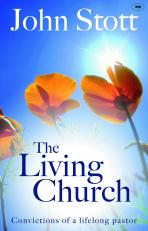GENERAL THEOLOGY The Living Church: Convictions of a Lifelong Pastor by John Stott (Nottingham: IVP , 2007). ‘Uncle John’, as he is affectionately known to many in the evangelical world, has produced another clear, faithful, and challenging book with much for the living church of the 21st century to chew on and learn from. It is essentially a work of practical ecclesiology, with chapters on God’s vision for the church, worship, evangelism, ministry, fellowship, preaching, giving, and social change. Three stimulating historical appendices (including “Why I am still a member of the Church of England” and “Reflections of an octogenarian”) and an autobiographical sketch complete the book. The latter contains the amusing anecdote of how, as a child, the young Stott made paper pellets out of bus tickets and dropped them from the balcony of All Souls, Langham Place onto the fashionable hats of the ladies below. This should help us not to despair too much of the children in our churches! Some of the material in the book will be familiar to avid Stott fans. Much of chapter 4 is very close to his Acts BST commentary, and chapter 7 has been printed in at least two other places. But on the whole it is all good material which deserves to be collected in one place for our convenience. In the course of the book he helpfully touches on the emerging church, the homogenous unit principle, and other hot topics in ecclesiological discussions, in a way that is fair and reveals a wealth of careful study and reading. There are many provocative lines, e.g. “We take little trouble to prepare our worship services. In consequence, they are sometimes slovenly, mechanical, perfunctory and dull. At other times they are frivolous, to the point of irreverence” (page 45) or “Any political party would be wildly jealous of the buildings and personnel which are at [the local church’s] disposal” (page 52) or “God expects those called to the ministry of the word to concentrate on their calling and on no account to allow themselves to be distracted by social administration (page 76). He often has an amusing way of getting his point across such as when he writes, “there is a strange reluctance among us to engage in personal evangelism. We sometimes sing ‘Oh for a thousand tongues to sing my dear redeemer’s praise’. But it is a useless wish. For one thing we will never have a thousand tongues. For another, if we had them, we would not know what to do with them when the one tongue we have is often silent” (page 98)! I was cut by the observation that we often complain about our society but “If therefore darkness and rottenness abound, it is to a large measure our fault, and we must accept much of the blame” (page 143). The chapter on preaching is a great reminder of what we should be about, but it also illustrates what is a characteristic and sometimes unhelpful habit of mind. Stott is a fan of paradoxes and dichotomising; that is, he will often look at things from two angles, dismiss both extremes as unstable and unbiblical, and then put forward a neatly balanced, integrating view. This can sometimes be a useful heuristic device, but it can also lead us astray, as I personally think it does in Stott’s view of women’s ministry (pages 81-82) where two truths from the Bible are felt to be in need of being “reconciled” as if they were in conflict thus leading to some weak arguments in an attempt to find the mediating position. This, of course, is a very ‘Anglican’ tactic! And Stott’s Anglicanism is prominent in this book in a surprising and unexpected way. He quotes very liberally from Bishops and Archbishops. Calvin and Spurgeon get a few mentions too, but I think the Episcopal bench is vastly overrepresented in the collection of quotations used throughout the book’s newer sections. It is good to be able to notice and use some of the positive and valuable things bishops have said; it is easy to be too dismissive of bishops and give the impression that it is the height of discernment to be constantly negative and critical of them. Perhaps Uncle John is trying subliminally to teach us something here? But I still found it quite odd to hear from so many bishops. In addition to that, there are quotes from several official Church of England Reports and even Lambeth Conferences (and not just resolution 1.10 from 1998 with which we are all familiar). If some criticise Stott for spending too much time thinking about evangelicalism internationally and not enough time helping to reform his own denomination, he at least demonstrates here that he is not unaware or uninformed about what has been going on, even if at times we might wish him to have been more critical. There is some unnecessary cluttering of the text with otiose transliteration of Greek words, and here and there readers will find things they disagree with or wouldn’t quite have put that way. But how useful to read Stott as he reflects on movements in the church he has seen come and go in the last 40 years. So this is an extremely beneficial book which I recommend as a helpful survey and heartfelt challenge on all the areas it covers. I hope it will come down in price so I can afford to give some copies away! This review was published in Churchman 122/4 (2008). |
